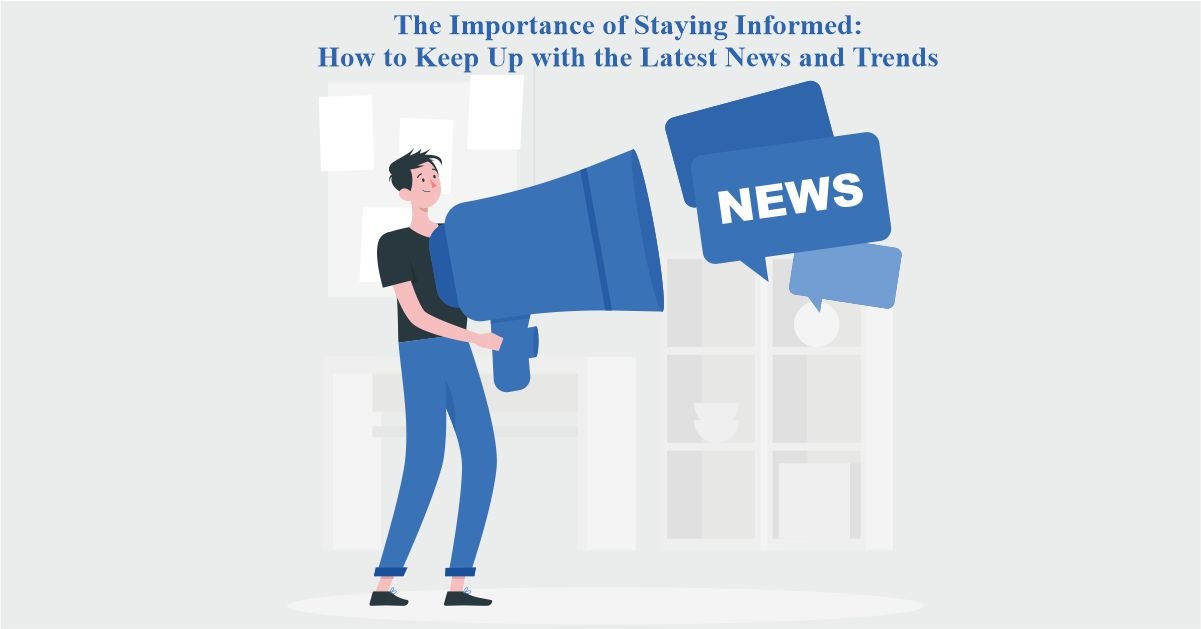In today’s fast-paced world, staying informed is more important than ever. With major events shaping global politics, economics, technology, and society, the news provides us with the information needed to make informed decisions in our daily lives. However, with the rise of digital media and the flood of information online, it can be overwhelming to navigate the news landscape. This blog will explore why staying informed is crucial and offer practical tips for discerning reliable sources and avoiding misinformation in 2024.
1. Why Staying Informed Matters
- Informed Decision-Making: Whether you’re voting in elections, making investments, or engaging in community issues, having access to accurate and timely information is essential. News provides context for the world around us, helping us understand how global events impact our local lives.
- Civic Responsibility: A well-informed citizenry is crucial to the health of a democracy. By staying up-to-date on current events, you contribute to a more educated and engaged society. Being aware of social, environmental, and political issues allows you to participate in meaningful discussions and advocate for positive change.
- Personal Impact: News doesn’t just cover distant events; it affects personal matters like healthcare, education, and employment. Understanding how national policies or international markets can influence your personal finances, career opportunities, or retirement plans is a significant advantage in today’s world.
2. How to Choose Reliable News Sources
- Established, Reputable Outlets: In an age where anyone can publish information online, it’s essential to rely on established news outlets with a proven track record of journalistic integrity. Publications like The New York Times, BBC, and The Washington Post have long histories of fact-checking and editorial standards.
- Cross-Referencing Information: Don’t rely solely on one news source. It’s a good habit to cross-reference major stories with other reputable outlets to get a fuller picture. Different outlets may provide various angles or insights on the same story, offering a more balanced perspective.
- Fact-Checking Services: With the rise of misinformation, fact-checking has become more important than ever. Services like Snopes, FactCheck.org, and PolitiFact specialize in verifying claims made by public figures, politicians, and viral stories.
3. Navigating Digital News Platforms
- Social Media’s Influence on News Consumption: Social media platforms like Facebook, Twitter, and Instagram have revolutionized the way we consume news. While they offer instant access to breaking news, it’s important to be cautious. Many false or misleading headlines can go viral, spreading misinformation quickly.
- Identifying Misinformation: To avoid falling prey to misinformation, always check the source of the news story. Look for verified credentials and consider whether the headline seems sensational or implausible. Often, misinformation is spread by unverified accounts or biased sites.
- Use of News Aggregators: Apps like Flipboard, Google News, and Apple News curate news stories from multiple sources based on your interests. These aggregators provide a variety of perspectives on trending topics and allow you to customize your news feed according to your preferences.
4. The Rise of Podcasts and Video News
- News Podcasts: For those who prefer audio, podcasts have emerged as a popular way to stay informed. From daily news briefings like The Daily by The New York Times to in-depth political analysis from shows like Pod Save America, podcasts allow you to consume news on the go.
- Video News: Platforms like YouTube and streaming services have also become go-to sources for news, with outlets such as VICE News and BBC World offering live coverage and detailed reporting. Be mindful, though, to follow verified channels and avoid conspiracy-driven content.
5. International News Sources
- Stay Globally Informed: It’s important to consume news from international sources to gain a broader understanding of global events. Media outlets like Al Jazeera, Reuters, and Deutsche Welle provide comprehensive international coverage, offering perspectives that might not be covered in your local news.
- Diverse Perspectives: Consuming international news helps avoid echo chambers and encourages a more nuanced view of global affairs. It allows you to see how different cultures and regions respond to major events, fostering a more open-minded approach to world issues.
6. Combatting News Fatigue
- What is News Fatigue?: With the constant flow of news, it’s easy to feel overwhelmed, stressed, or anxious, especially when covering topics like natural disasters, political conflicts, or pandemics. News fatigue is a common phenomenon where people feel mentally exhausted from the relentless stream of negative headlines.
- Setting Boundaries: To avoid news fatigue, set limits on how much time you spend consuming news each day. It’s okay to take breaks and disconnect when necessary. Consider scheduling specific times to check the news rather than constantly scrolling through updates.
- Focusing on Positive News: While staying informed is important, it’s equally beneficial to balance your news diet with uplifting stories. Websites like Good News Network and Positive News focus on stories of kindness, innovation, and success, which can help restore your faith in humanity and offer a reprieve from negative news cycles.
Conclusion
In an era where information is at our fingertips, staying informed has never been easier—but it also comes with challenges. By relying on reputable news sources, cross-referencing information, and being mindful of the platforms you use, you can navigate the news landscape with confidence. Remember to set healthy boundaries and prioritize balance in your news consumption to stay engaged without feeling overwhelmed.
What are your strategies for staying informed without getting fatigued? Let us know in the comments below!
